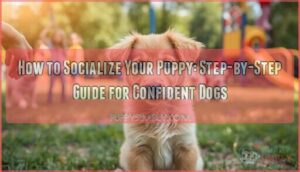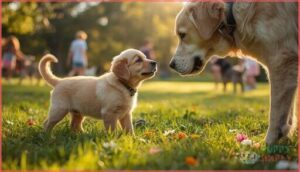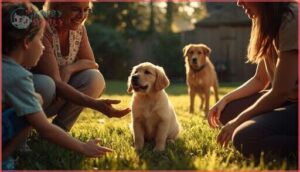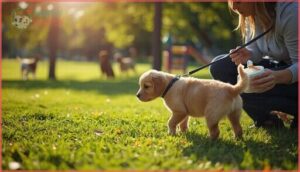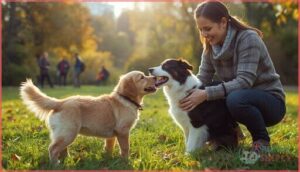This site is supported by our readers. We may earn a commission, at no cost to you, if you purchase through links.
Your puppy’s first few months don’t just determine whether they’ll sit on command or come when called—they shape how they’ll perceive the world for the rest of their life. A German Shepherd who meets friendly strangers, hears fireworks, and rides in cars during those early weeks grows into a confident adult, while a littermate kept isolated often struggles with fear and anxiety that no amount of training can fully reverse.
The difference isn’t genetics or luck; it’s socialization, and the window to get it right is surprisingly narrow. Between 3 and 16 weeks old, your puppy’s brain is wired to absorb new experiences like a sponge, building neural pathways that determine whether unfamiliar situations trigger curiosity or panic.
Understanding how to socialize your puppy during this critical period—while keeping them safe from disease and avoiding overwhelm—gives you the power to raise a dog who moves through life with ease instead of anxiety.
Table Of Contents
- Key Takeaways
- Why Puppy Socialization Matters
- Best Time to Start Socializing Puppies
- Step-by-Step Puppy Socialization Techniques
- Safe Socialization Practices
- Socializing With Other Dogs and People
- Handling Setbacks and Advanced Strategies
- Frequently Asked Questions (FAQs)
- How to socialize an unsocialized puppy?
- How to socialize a puppy with another puppy?
- How to socialize a puppy?
- Why is puppy socialization important?
- When to start socializing a puppy?
- Should I force my dog through the puppy socialization checklist steps?
- Do you need puppy socialization training?
- Should you socialize a puppy or an adult dog?
- What are the long-term benefits of puppy socialization?
- What are the signs of a puppy that needs more socialization?
- Conclusion
Key Takeaways
- Your puppy’s critical socialization window, between 3 and 16 weeks, shapes lifelong confidence and behavior, with experiences during this narrow period determining whether unfamiliar situations trigger curiosity or fear throughout their adult life.
- You can safely socialize your puppy before full vaccination by using pet strollers for outdoor exposure, avoiding high-risk areas like dog parks, and arranging controlled meetings with healthy, vaccinated dogs in clean environments.
- Successful socialization relies on positive reinforcement and letting your puppy set the pace—pairing new experiences with treats and praise while watching for stress signals like tucked tails or pinned ears tells you when to slow down.
- Missing the early socialization window or experiencing setbacks doesn’t mean failure, but persistent fear or anxiety lasting more than two weeks requires professional help from veterinary behaviorists or certified trainers who use reward-based methods.
Why Puppy Socialization Matters
Socializing your puppy isn’t just about helping them make friends—it’s about shaping who they’ll become as an adult dog.
Early positive experiences during this critical window help prevent future behavioral issues, especially in breeds that can be stubborn learners like beagles, who benefit greatly from consistent early training.
The experiences you provide during those early weeks and months will influence how your dog reacts to the world around them for the rest of their life.
Those early weeks shape how your dog sees the world for life
Let’s look at why this process matters so much and what it can do for both you and your dog.
Preventing Fear and Behavioral Issues
Fear and anxiety in dogs often stem from what happens—or doesn’t happen—during the socialization period. When puppies miss positive experiences between 3 and 14 weeks, they’re more likely to develop behavioral problems that need intensive behavioral therapy later.
Early socialization strategies with positive reinforcement help you prevent puppy anxiety, reduce future fear recognition issues, and support healthy puppy development stages through careful confidence building during this critical window.
Understanding the importance of the critical socialization period can help owners make the most of this essential phase for their puppies.
Building Confidence and Adaptability
Building confidence goes hand in hand with preventing fear. When you expose your puppy to different surfaces, sounds, and environments during the socialization period, you’re teaching adaptability through environmental enrichment and sensory exposure.
Positive reinforcement during these experiences strengthens social learning, helping your puppy develop the resilience needed to handle life’s surprises. That confidence becomes the foundation for healthy puppy development and lifelong adaptability training.
Dogs benefit greatly from intentional exposure to new experiences, which helps shape their adaptability and calmness in various situations.
Strengthening The Human-Animal Bond
Socialization strengthens the emotional connection between you and your puppy, turning everyday moments into trust building opportunities. When you guide your puppy through new experiences with positive reinforcement training, you’re not just teaching—you’re forming relationship dynamics that last a lifetime.
- Short training sessions create fun, shared games that link you to safety and cooperation
- Daily walks and play therapy teach your puppy to explore the world alongside you
- Learning your puppy’s body language helps you respond when they need reassurance
- Regular grooming and feeding routines show your puppy you’re reliable and caring
- Gentle interactions trigger oxytocin release, deepening attachment for both of you
These bonding techniques during the socialization period shape responsible pet ownership and support healthy puppy development.
Best Time to Start Socializing Puppies
Timing is everything in puppy socialization, and there’s a narrow window when your puppy’s brain is most receptive to new experiences.
Missing this critical period can make it harder to raise a confident, well-adjusted dog, but starting too early without proper precautions can put your puppy’s health at risk. Let’s look at the key timeframes you need to know to get socialization right.
Critical Socialization Period (3-16 Weeks)
Think of your puppy’s first 16 weeks as a narrow doorway that swings wide open, then begins to close. Between 3 and 16 weeks, the critical socialization period gives you the most powerful window for shaping canine emotional intelligence and fear response management. During this phase, puppy brain development allows your pup to absorb new experiences with curiosity rather than fear, making environmental enrichment and social learning theory work in your favor. After roughly 14 weeks, puppies naturally become more cautious, so completely unfamiliar situations require extra patience and positive reinforcement to keep socialization period progress on track.
You can protect your pup’s immune system while still introducing new experiences by following gentle puppy exposure guidelines that prioritize safety during this vulnerable stage.
| Age Range | What’s Happening | Your Focus |
|---|---|---|
| 3–4 weeks | Eyes and ears open; first play with littermates begins | Breeder oversees gentle exposure |
| 5–7 weeks | Bite inhibition develops; mother teaches boundaries | Continued breeder socialization |
| 8–9 weeks | Puppy comes home; brief caution from change | Start positive home introductions |
| 10–12 weeks | Peak curiosity; most open to new sights and sounds | Optimize outings and varied experiences |
| 13–16 weeks | Natural caution increases; socialization window closes | Reinforce lessons; maintain positivity.” |
Use this timeline to plan puppy socialization tips that match your pup’s developmental stage, ensuring that puppy socialization and development stays positive, safe, and effective throughout the entire critical socialization period.
Early Exposure From Breeders
Responsible breeders who understand canine development lay the foundation before you even meet your pup. During puppy rearing and development, they apply breeder handling practices, early stimulation exercises, and puppy enrichment programs that shape the entire socialization period.
Quality breeder education means your puppy arrives with:
- Gentle daily touch and varied human contact
- Early neurological stimulation between days 3 and 16
- Exposure to household sounds, surfaces, and safe scents
These socialization methods give your pup a confident head start.
Socialization Before Full Vaccination
Despite common worries, you don’t need to wait until all shots are done—your puppy’s critical socialization period runs from about 3 to 16 weeks, so keeping them home misses the window.
Most vets now recommend starting safe outings one week after the first vaccine, around 7 to 9 weeks, balancing disease risks with essential puppy interactions and controlled exposure during this pivotal timeframe.
Step-by-Step Puppy Socialization Techniques
Now that you understand when to start, let’s walk through exactly how to socialize your puppy in a way that builds confidence without overwhelming them. The key is making each new experience positive and letting your puppy move at their own pace, which means following a few practical techniques that work together.
Here’s how to approach socialization step by step, from introducing new stimuli to getting your whole household involved.
Introducing New Sights, Sounds, and Smells
Ever notice how a puppy’s world is a patchwork of sights, sounds, and scents? During the socialization period, you’ll want to guide sensory exploration gently—let your puppy sniff grocery bags, watch bikes roll by, and hear quiet household noises.
Environmental enrichment, visual stimulation, noise desensitization, and olfactory training are essential socialization techniques for dogs at this age.
Positive Reinforcement and Fun Experiences
You’ll make puppy socialization stick when you pair new experiences with positive reinforcement—treats, praise, or toys turn scary moments into exciting adventures. A marker word like “yes” or a quick click signals the instant your puppy does something brave, creating positive associations that build confidence over time.
- Keep pea-sized soft treats handy during outings so your puppy stays focused and enthusiastic
- Turn socialization into playful interactions with nose-targeting games or quick tug sessions between introductions
- Reward calm behavior within one second to help your puppy connect fun experiences with confident responses
The socialization process works best when every interaction feels like play, not pressure.
Gradual Exposure and Letting Puppies Set The Pace
Think of puppy socialization like climbing stairs instead of leaping—one step at a time keeps your puppy confident and safe. Start in calm environments where your puppy can observe from a distance, then move closer as they show comfort through relaxed body language and tail wags.
Gentle introductions work because puppies’ stress signals like lip licking or freezing tell you when to slow down, ensuring emotional safety through gradual exposure that respects their pace.
Involving Family and Friends
Your puppy learns faster when multiple people shape their world, so assign family roles like rotating feeding, walking, and grooming to normalize different handlers.
Plan structured playdates with calm dogs, coach visitors to crouch sideways and offer treats gently, and encourage shared care routines that teach your puppy all kinds of people bring good things—building trust through variety in the socialization process.
Safe Socialization Practices
Socializing your puppy doesn’t mean throwing caution to the wind, especially during those vital early weeks when their immune system is still developing.
You’ll need to strike a balance between exposing your pup to new experiences and protecting them from potential health risks. Here’s how to keep your puppy safe while still giving them the socialization they need to thrive.
Managing Health Risks Before Full Vaccination
During the first sixteen weeks, your puppy’s immune system is still developing, making disease prevention a top priority alongside socialization.
Most puppies start their vaccine schedules around six to eight weeks, receiving boosters every three to four weeks until about sixteen weeks.
Before full vaccination, focus on health screening your puppy’s playmates, avoiding areas with unknown dogs, and practicing infection control to reduce parvovirus and other serious health risks.
Using Pet Strollers and Carriers for Outings
One clever dog socialization technique is to place your puppy in a pet stroller or carrier for outdoor adventures, letting them soak up the bustle of urban exploration without touching contaminated ground.
Stroller safety features like mesh windows and leash clips keep your puppy secure during the socialization process while they watch people, bikes, and traffic from their cozy transport spot.
Avoiding High-Risk Areas and Sick Animals
While strollers help with disease prevention, risk assessment means steering clear of locations where parvovirus and other pathogens lurk—dog parks, pet stores, and busy trails become hazardous zones until your puppy completes vaccination timing around sixteen weeks. Safe environments include your backyard, clean indoor spaces, and supervised visits with healthy, fully vaccinated dogs, protecting puppy health risks without sacrificing puppy socialization.
- Dog park safety and etiquette matter less than avoiding them entirely during your puppy’s vulnerable window
- Veterinary care includes discussing local outbreaks so you can tailor your puppy hygiene routine to real threats
- Politely declining greetings with coughing, lethargic, or unknown dogs keeps your pup safe
Monitoring Body Language and Comfort
After steering clear of risky spots, your next job is tuning into Body Language Cues to keep your puppy in their Canine Comfort Zones. Watch for Puppy Stress Signs like tucked tails or pinned ears—these signal fearfulness or anxiety.
Adjust your Socialization Pace, use Calming Techniques, and let your puppy choose engagement. This approach fosters healthy Dog Behavior and successful Puppy Socialization.
Socializing With Other Dogs and People
Once your puppy has a handle on basic exposure to sights and sounds, the real magic happens when they start interacting with other dogs and people.
These early encounters shape how your pup will relate to the world for years to come, so getting them right matters more than you might think.
Let’s walk through how to introduce your puppy to new canine friends and a variety of people in ways that build confidence instead of fear.
Introducing Dogs to Each Other Safely
When introducing dogs to each other safely, think of it like setting up a first date—neutral ground matters. Dogs experience less territorial behavior in open spaces like quiet parks, which gives you room to manage any tension that bubbles up.
Follow these dog socialization techniques to create positive first meetings:
- Start with parallel walking: Keep both dogs on leash, walking in the same direction with 10 to 30 feet between them, gradually closing distance only when their dog body language shows comfort—soft eyes, loose bodies, and wagging tails.
- Watch for stress signals: Yawning, lip licking, or stiff postures tell you to increase space immediately, while relaxed mouths and wiggly bodies signal readiness for closer interaction.
- Keep leash greetings brief: Allow just three seconds of sniffing before gently guiding them apart, repeating these short hellos throughout your walk rather than forcing one long encounter.
For home introductions, managing dog introductions means removing toys and food bowls beforehand, then bringing dogs inside separately while still leashed. Use baby gates to let them adjust gradually, and provide each dog its own bed and quiet space. These introducing new pets strategies help prevent resource guarding and give both animals room to decompress, setting the foundation for a peaceful household where confidence can flourish naturally.
Meeting Strangers, Children, and Different Environments
Stranger danger” disappears when you structure introductions thoughtfully during the critical socialization period. Have new people stand sideways, avoid direct eye contact, and keep voices soft, which reduces pressure on your puppy and builds confidence through calm, controlled encounters.
For child interactions and broader environmental adaptation, use these socialization techniques for dogs:
| Scenario | Technique |
|---|---|
| Meeting children | Supervise closely, teach kids to pet under the chin, and keep sessions to 30-60 seconds before taking breaks |
| Varied appearances | Expose your puppy to hats, sunglasses, umbrellas, wheelchairs, and strollers at a comfortable distance, pairing each sighting with treats |
| New environments | Start in quiet parking lots or calm sidewalks, then progress to busier spaces like pet-friendly stores and café patios over several weeks |
Always let your puppy set the pace—if it looks nervous around someone or somewhere new, increase distance and try again tomorrow rather than forcing the interaction.
Handling Setbacks and Advanced Strategies
Even with your best efforts, your puppy might hit a rough patch, freeze up during introductions, or show signs of fear you didn’t expect.
These setbacks don’t mean you’ve failed—they’re a normal part of the process, and you can work through them with the right approach.
Here’s how to recognize when things aren’t going as planned, what to do next, and when it’s time to bring in extra support.
Recognizing and Managing Fear Periods
Your puppy will naturally go through fear periods between 8 and 11 weeks, then again around 6 to 14 months, each lasting 2 to 3 weeks. During these windows in the critical socialization period, managing puppy fear and anxiety requires calm, patient handling.
Watch for these signs:
- Ears pinned flat and tail tucked tightly between legs
- Excessive whining, panting, or involuntary urination
- Startling easily at sounds or sudden movements
- Avoiding familiar people or objects they once enjoyed
- Raised hackles along the back with whale eye showing
Stay calm yourself, redirect attention with treats, and let your puppy approach scary things at their own pace using gentle calming techniques.
What to Do After a Bad Experience
When a bad experience shakes your puppy’s confidence, calmly remove them from the situation until stress signals like trembling or hiding fade.
Move to a quiet space with familiar people, then use positive pairing—offer high-value treats when they see the trigger from a safe distance.
These desensitization methods and calm environments help manage puppy fear and anxiety, rebuilding trust through recovery techniques focused on their emotional comfort.
Adjusting Socialization for Older Puppies
Older puppies missed their critical window, so you’ll need a slower, gentler approach to tackle socialization challenges in older puppies. Use gradual exposure techniques and watch for stress signals like lip licking or tucked tails, which reveal when to pause.
- Start at a distance where your puppy stays calm, then close the gap across multiple sessions
- Upgrade to high-value rewards like cheese or soft meat to build positive associations
- Let your puppy choose whether to approach new people, dogs, or environments instead of forcing contact
These puppy socialization strategies support dog behavior modification through puppy development stages.
When to Seek Professional Help
Sometimes you’ll notice your efforts aren’t enough, and that’s when professional guidance becomes critical. If your puppy freezes, hides, or shows persistent aggression for more than two weeks despite gentle exposure, expert intervention can prevent long-term canine behavioral health issues.
| Behavioral Red Flags | When to Contact an Expert |
|---|---|
| Persistent fear or hiding | More than 2 weeks of no improvement |
| Snapping during normal interactions | Any time it occurs repeatedly |
| Refusing treats in new places | When paired with escape attempts |
| Reactivity getting worse | Despite consistent positive training |
| Disrupting daily routines | Walks, vet visits become impossible. |
Veterinary behaviorists and certified trainers who use reward-based methods address puppy anxiety and socialization challenges effectively during critical puppy socialization and training periods, helping you understand dog behavior and psychology while building confidence.
Frequently Asked Questions (FAQs)
How to socialize an unsocialized puppy?
Start by giving your undersocialized pup a quiet safe zone at home, then slowly introduce new sights, sounds, and people using treats to build Positive Reinforcement and puppy confidence through consistent Gentle Exposure sessions.
How to socialize a puppy with another puppy?
Introduce your puppy to another puppy on neutral ground, like a quiet park, letting them sniff and play briefly with loose leashes while you watch their body language for relaxed movements.
They should display wiggly movements as they interact, which is a sign of comfort and friendliness.
How to socialize a puppy?
As the saying goes, a stitch in time saves nine—socializing your puppy early prevents lifelong behavioral issues.
Expose them gently to people, places, sounds, and dogs between 3 and 16 weeks using positive reinforcement.
Why is puppy socialization important?
Early socialization prevents fear-based aggression and builds puppy confidence through positive exposure to new people, places, and sounds during the critical 3-16 week window, shaping lifelong behavioral health and social skills.
When to start socializing a puppy?
You can begin during the sensitive period between 3 and 16 weeks, when early puppy development makes new experiences feel normal.
Breeders start around 3–4 weeks, and puppy socializing classes accept puppies at 7–8 weeks with initial vaccines.
Should I force my dog through the puppy socialization checklist steps?
No, don’t force your puppy through socialization steps. Forced interactions often backfire, creating fear instead of confidence.
Let your puppy choose to engage, watch for stress signals, and use positive reinforcement to build trust.
Do you need puppy socialization training?
Puppy socialization training through formal classes isn’t always necessary, but it offers structured exposure and professional guidance.
A confident puppy in a busy household may thrive with careful home socialization alone.
Should you socialize a puppy or an adult dog?
You should focus on puppy socialization during the critical 3-16 week window, when puppy development allows easier confidence building.
Though adult training can still improve socialization benefits through patient, gradual exposure and lifelong learning.
What are the long-term benefits of puppy socialization?
Emotional resilience, behavioral stability, and lifelong learning all stem from early social confidence.
Well-socialized puppies develop fewer canine behavioral issues, adapt easily to change, and enjoy health benefits through active, stress-free lives built on positive reinforcement.
What are the signs of a puppy that needs more socialization?
When your puppy’s tail tells a story of worry signs—constant tucking, freezing around strangers, reactive barking at everyday sights, or stress signals like whale eye and lip licking—they need gentler, more positive social exposure.
Conclusion
One client’s Australian Shepherd, Max, spent his early weeks meeting delivery drivers, exploring crowded parks, and riding the subway—all before 14 weeks old.
Today, he’s the dog who sleeps peacefully through fireworks while his anxious neighbor barks for hours. That’s the power of early socialization. When you invest time now to socialize your puppy properly, you’re not just teaching skills—you’re building the foundation for a lifetime of trust, resilience, and joy together.
- https://www.petmd.com/dog/general-health/when-can-puppy-go-outside
- https://sdhumane.org/resources/puppy-socialization-checklist/
- https://extension.psu.edu/importance-of-socialization-in-puppy-raising-series-part-1/
- https://www.doggoneproblems.com/criticalsocializationperiod/
- https://avsab.org/wp-content/uploads/2018/03/Puppy_Socialization_Position_Statement_Download_-_10-3-14.pdf

